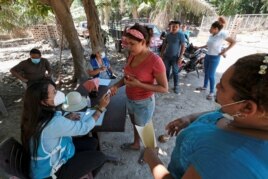23 May 2021
The ruling party of Honduras is giving aid to its supporters. But many supporters of opposing political parties say they have not received assistance during the coronavirus health crisis. Many have left Honduras as a result.
Cesar López and his family are from San Pedro Sula. This year, the Honduran government gave out rice and beans to poor residents.
However, López and his family got nothing. He said the food only went to supporters of the ruling National Party, which he opposes. He said it is much the same for government jobs and other aid.
López left for the United States earlier this year. He said his decision was partly the result of unfair aid policies during the pandemic and after two hurricanes last year.
He told Reuters, "the government only gives to its supporters." López was on his way to Texas and had stopped in a Guatemalan village.
The ruling party denies that it only helps its favorites. Officials said these claims are from opponents of President Orlando Hernández who want to make him look bad.
The conservative National Party forcibly took power in 2009 after a military coup. It has since built a powerful political organization that has great influence over the lives of 10 million Hondurans.
The National Party uses a system that experts call "clientelism." The term describes when a political party provides goods, services, money, jobs or aid in exchange for political support.
Andrew Seele is the president of the Migration Policy Institute, an immigration policy group in Washington, D.C. He said, "Sometimes the balance between staying and leaving is hope things could get better, and clientelism destroys that hope."
Political experts and those living in Honduras said supporting the ruling party does not guarantee money or food. Additionally, opposing it does not mean a permanent loss of public aid.

An activist from the ruling Partido Nacional (National Party) holds the identification of a woman to register on a list to receive help from the government for the people affected by the floods caused by hurricanes Eta and Iota, in El Progreso, Honduras.
The Latin American Public Opinion Project at Vanderbilt University in Tennessee reported on clientelism in 2019. It found Honduras had the second-highest level in Latin America after the Dominican Republic.
The study found that more than 18 percent of the Honduran voters they spoke to in 2014 had experienced clientelism. They said they were offered a gift, favor or aid in exchange for their vote in the 2013 presidential election. The study did not state which political parties reportedly made the offers.
For many Honduran migrants, the practice of clientelism offers them little hope and has become a part of their decision to leave.
Reuters spoke to more than 20 former and current Honduran government officials and experts. They said the National Party uses control of the government and money to help supporters, punish opponents and influence elections.
For years, Honduras has had problems with politicians misusing government money for personal gain and being involved in drug-trafficking.
The administration of President Joe Biden has made targeting corruption central to a $4 billion plan. The administration said the plan will deal with the "root causes" of migration from Honduras, Guatemala and El Salvador.
I'm Jill Robbins.
Laura Gottesdiener and Drazen Jorgic reported this story for Reuters. Gregory Stachel adapted it for VOA Learning English. Mario Ritter, Jr. was the editor.
--------------___________________________________________________________________
Words in This Story
coup – n. a sudden attempt by a small group of people to take over the government usually through violence